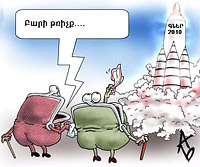We may have added that the CB would be surprised (because we mean the prices of goods). But to its honor the CB is not surprised at all. Here they quite easily mention that we are approaching the dual-digit inflation and they don’t exclude that the prices may grow higher.
And so while the representatives of the government continue insisting that inflation is in the center of their attention and jointly with the CB they are going to do everything to maintain the process in the allowable boundaries, the reality however develops in a totally different direction. According to the data of the National Statistics Service released two days ago, the 12-month inflation in the republic amounted to 9.6%. Before that, as of late October, the inflation was lower – 9.1%. Let us remember that the allowable limit according to our authorities was promised to be 5.5% during the year. But even the structure, which is legislatively authorized to conduct this function, confesses that they are not able to control and fix that. And that is the Central Bank of RA. On December 7, the CB Board summoned a session, during which they revealed that due to the increase of the demand and there is a possibility that the inflation may be essential in the near future due to the prevailing impacts. “Despite the slow rates of the recovery of the GDP of Armenia due to the internal developments of the economy, the Board is unanimous that under the same circumstances there is a little chance that the inflation will remain the allowed boundaries,” reads the statement of the CB. So there is a little chance that our officials will keep their promise. The first part of the mentioned statement is no less noteworthy. “Despite the slowly growing GDP rates in the country it is still difficult to provide actual means of pressure on inflation growth…” Let us clarify this. Traditionally it is accepted to say that inflation is the inseparable part of the economic growth. And if the prices are growing in parallel with economic growth, it is not accepted negatively. In other words inflation is the price the economy pays for its recovery. In this case, however, the CB didn’t leave any room for consolation. This structure mentions in an open text that our economy with its imperceptible growth doesn’t play any role and that cannot be the reason of inflation. So certain Armenian statesmen that love press conferences cannot refer any more to the necessity of inflation during economic growth. In this case they may say, “It is not our fault. The international prices are growing. The importation costs expensive and we sell at expensive prices.” However, this allegation lacks sincerity. The thing is that the highest growth was registered in grocery products, which are mostly produced inside the country. As the CB statement reads, “the inflation of fruits and vegetables, wheat products and dairy grew by 6.7% during the 12 months.” Let us also notice that according to the CB statement the grocery product prices grew by 7.5% during 12 months but according to the NSS the grocery product prices grew by 15.2% compared to the previous year. If the increase of the price of wheat may be connected with the high prices of imported flour and wheat then the increase of the prices of internally produced products – vegetables, fruits, meat, etc, will be very difficult to link with the international price growth or other external factors. Let us also mention that on the picture of the 9.6% general inflation the increase of the prices of grocery products by 15.2% speaks of the fact that first of all the socially vulnerable groups are affected by inflation because most of their income is spent on groceries. The seriousness of the situation is most seriously demonstrated by the comparison with the currency value. Currently one USD costs 360 AMD, while a year ago in the same period the USD rate was around 384 AMD. And it turns out that people, who receive monetary transfers from their relatives abroad get to exchange more USD at lower rates to purchase grocery. It is also not hard to imagine what would happen to the prices if the AMD devaluating in the country. The imported goods would jump astronomically high. It is not excluded that by preventing the AMD devaluation the financial authorities are trying to prevent another wave of inflation. The CB however, speaks of another tool – the interest rate of re-funding. On December 7, the CB made a decision to remain unchanged its level – 7.25%. This means that the CB doesn’t devalue the value of money to avoid additional inflation. Moreover, it is not excluded that refunding interest rates may be revised in the near future. “Taking into account the demand of the grocery goods and the growth of the GDP rates the CB Board found it expedient to restrict the monetary-credit policy,” reads the CB. Regardless of that, in Armenia many people are skeptical about the interest rates of refunding and its influence on the level of prices. In our country it is the monopolies that mostly affect the inflation. And as you know it is not the function of the CB to fight against monopolies.

